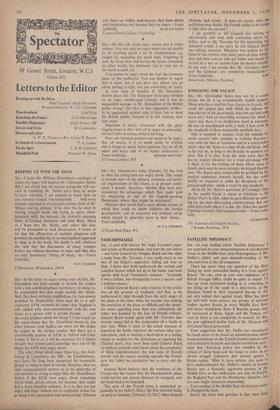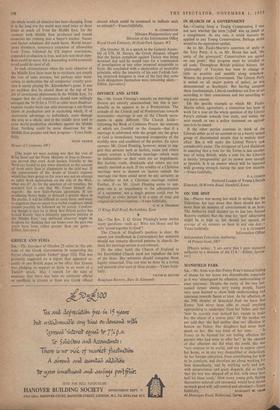SATELLITE DIPLOMACY SIR,—In your leading article 'Satellite Diplomacy' I am
surprised by your underestimation of anti-Russian forces in the Middle East, your disparagement of Mr. Dulles's ability and your misunderstanding of the role and force of the oil companies.
There has never been any question of the West 'lining up Arab nationalist feeling in a front against Russia.' No one, even in your own nightmare of a British Foreign Office, could be quite as stupid. To line up Arab nationalist feeling is as rewarding as the lining up of the sands in a dust-storm, as the Russians found in their attempted line-up of this not very valiant dust against Israel. What has lined up, and with some success, are groups of national leaders against Russia in every Middle East State and major sheikhdom. Even if Russian groups may be ensconced in Syria, Egypt and the Yemen, not even in Syria is one completely in control. To this, the new rightward incline both of Mr. Hourani and of Colonel Serraj gives point. Your suggestion that Mr. Dulles has overplayed his hand seems to be based on misinformation about troop movements on the Turkish frontier and on your extraordinarily dramatic and almost novelettish state- ment that 'American policy was rebuffed by the refusal of King Saud and the Iraqis to enter on an all-out struggle [whatever that means] against a Syrian regime.' What is more serious, you seem to have underestimated Mr. Dulles's success in forcing Russia into a blatantly aggressive posture in the Middle East, to the vindication, not only of NATO, the Baghdad Pact and the Eisenhower Doctrine, but of a new Anglo-American relationship.
Your reading of the Middle East oil situation seals to disregard the facts. Surely the basic new pressure is that since Sue! ..he whole world oil situation has been changing. Even if in the long rust the world may need twice or three times as much oil from the Middle East, for the moment both Middle East producers and transit countries are running into a buyer's market. Nasser and Syrian subuteurs did much harm. World invest- ment elsewhere, temporary extension of allowables from Texas followed by US import restrictions, expanded production in Iran, and new non-Arab pipe- Nnes could do more, but a descending world economic trend could do most of all.
In such circumstances when the main objective of the Middle East State must be to maintain, not simply the rate of sales increase, but perhaps sales them- selves, to undermine the oil companies' royalty posi- tion is surely playing Mr. Khrushchev's game. It was no accident that he placed them at the top of his list of unwelcome phenomena in the Middle East. To suggest that the oil companies should now willingly abrogate the 50-50 for a 75-25 or other more disadvan- tageous royalty basis can only encourage a cut-throat chaos in production and in marketing which, if of short-term advantage to individuals, must damage the area as a whole, and in the middle term tend to raise world production elsewhere against the Middle East. Nothing could be more disastrous for the Middle East peoples and their progress.—Yours faith- fully,
[The point we were making was that the visit of King Saud and the Prime Minister of. Iraq to Damas- cus proved that even Arab leaders friendly to the West are bound to pay more attention to the concept of Arab unity than to alignments in the cold war. If the appeasement of the Arabs at Israel's expense which has been going on for years was not an attempt to enlist Arab nationalism on the side of the West, what was it? As for the question of oil royalties, the essential fact is one that Mr. Fraser himself dis- regards: the new Italo-Persian agreement. If oil- producing States begin to demand a greater share in the profits, it will be difficult to resist them, and wiser to negotiate than to resort to a verbal toughness which cannot possibly be followed up by action. Comfort- ing though it may he to think that British policy has forced Russia 'into a blatantly aggressive posture in the Middle East,' any unbiased observer might be forgiven for thinking that our losses over the past two years have been rather greater than our gains.— Editor, Spectator.]

































 Previous page
Previous page